2006 Egypt
11 January 2007, Thursday; Pension Roma,
Cairo, LE82 (incl)
We slept well again last night and were out
and about a little earlier than yesterday. Because my feet are so sore we took
a taxi to our first port of call instead of walking.
We have been approached on a couple of
occasions by Naser Aly, a rotund cheerful taxi driver who bases himself in the
street here hoping for, and getting, custom from Pension Roma’s guests and
long-term residents. Naser Aly says Mrs Cressaty, Pension Roma’s owner, is his
second mother. His dad did the laundry at Pension Roma for many many years. He
used to help as a child, then was “promoted” to working in the dining room. He
had brought some potted plants to put outside the newly renovated Pension just
this week.
For LE20 he drove us to Beit as-Suyhami, a
traditional family mansion typical of those built from Mamluk times to the 19th
century. 150 rooms and a wonderful example of a rich man’s house in the heart
of Islamic Cairo. A rabbit warren of a place. With tiny hidey-hole rooms, and
large stunning reception rooms. With ceilings, wooden and carved, sometimes
three-storeys high. With wonderful mashrabiyyas and a courtyard garden. Once
off the street you are completely sheltered from the chaos that is Cairo – from
its noise and smell and congestion. Just peace and some greenery and birdsong.
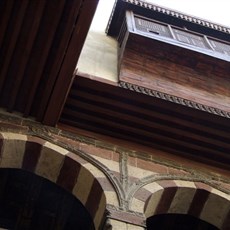
Beit as-Suyhami
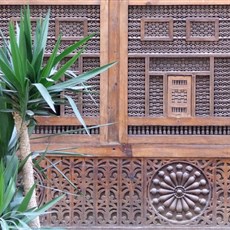
Beit as-Suyhami
Then through incredibly narrow alleys (through which cars still somehow manage to squeeze) to Wikala al-Bazara, a caravanserai. Another stunning building with a courtyard for camels (in its heyday) and small rooms for storage (now being used for offices) and “hotel” rooms on two floors above for merchants. In Ottoman times there were over 360 caravanserai in the city; less than 20 remain.
We had planned to visit three mausoleums, but after orange juice, which we drank sitting on a step in the street, and finding that the first of the three was closed for prayers, we decided to photograph the stunning minaret just there and then simply stroll.
We found ourselves almost immediately in Khan al-Khalili. So shopped, drank mint tea, shopped some more. We bought a T-shirt for Martin and several mother-of-pearl inlaid boxes, with plastic / camel bone bits too. Anybody’s guess which!
The market is both for tourists and locals. And one sees considerably more of the latter. In fact, most of the stretch we saw – some alleys incredibly narrow – was packed with “local” fare with traders hawking their goods in loud voices or over microphones. And women be-doeked and robed discussing and shopping and strolling.
We actually managed to find the perfume shop we had seen in our first Khan experience back in December. A place opened (I think) 68 years ago by granddad.
First they gave Charl mint to sniff for his cold. Then we were taken into the alley for me to drink hot Karkhady (hibiscus) tea – while one of the cousins dealt with an older couple in the shop. When they left we were invited back into the narrow shop. Where I ended spending more than I had planned and getting more than I had bargained for! After smelling virtually everything in the shop I bought a small Jasmine for Jana and a medium Lotus for myself. To round up the purchase to LE200 I was persuaded to take Queen of Egypt and was then “given” another small bottle of Jasmine as a parting gift. Which all serves to illustrate that my bargaining skills suck!
By then we wanted something to eat and to head home so Charl could take his head cold to bed. We somehow wandered into a road that catered exclusively to a wealthier local clientele. Gold-plated brass chandeliers dripping crystals, frilly baby carriers at a shop called Uncle Sam’s, long drops of artificial flowers. Quiet and well-mannered and quite different from the Khan (where, in all fairness, we found the hassle totally manageable).
But no food! So in a taxi (LE10) to Ataba Metro, to walk underground to 26 July (we have belatedly learned which exit is best for Pension Roma) and to lunch on excellent chicken down a side alley (LE25).
One must at all costs ignore the fact that salad is chopped on a greasy board. That the floors are slippery with grease. That the tables are wiped with grubby cloths. That everything is grimed with dust and pollution. And focus on the tastes and textures of the food – and the fact that we have not once been ill.
Charl spent what was left of the afternoon in his bed, while I looked at my photos and tried to catch up the diary. I was only partially successful at this as I was button-holed by the French resident who spent some time sharing with me a long list of current anxieties.
She did tell me where to go for food in the area, however, which is how we found ourselves one street back from and parallel to 26 July. Alive with restaurants and tea shops – most spilling out onto the pavement – and strolling, eating, smoking, drinking (non-alcoholic), chatting Cairenes. Loud music, nice atmosphere. Everyone here smokes. And there seem to be few smoke-free zones. The museums, the fast ferry, perhaps the train.
We bought baklava at a new place on the corner – next to the pharmacy at which we had obtained two items for Charl’s cold at the ridiculously low price of LE16. The baklava was the best yet. Fresh and crisp and varied and delicious.
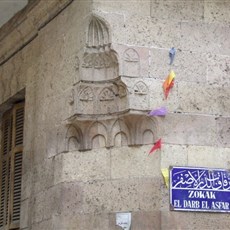
Cairo
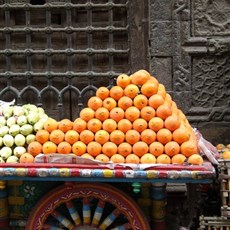
Cairo
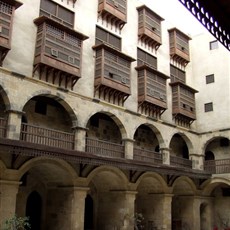
Wikala al-Bazara
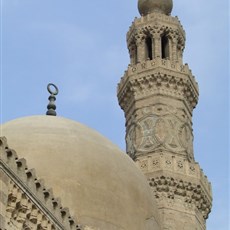
Mosque
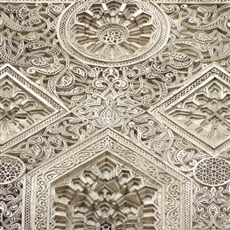
Mosque
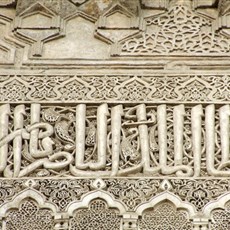
Mosque
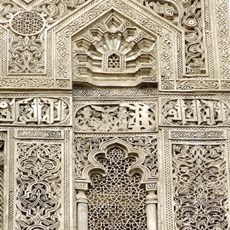
Mosque
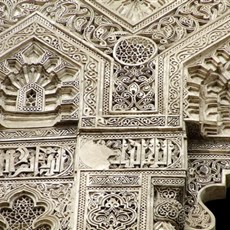
Mosque